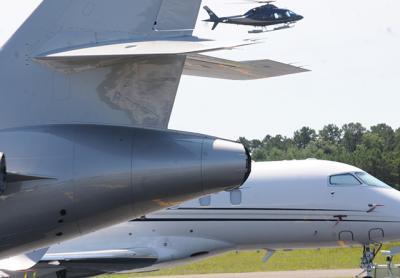East Hampton to Take Airport Fight to Supreme Court

East Hampton Town followed through this week on its promise to take the fight over local control of the East Hampton Airport all the way to the United States Supreme Court.
Officials announced on Monday that town attorneys had filed a petition with the Supreme Court seeking to overturn a lower court’s determination last fall striking down curfew restrictions at the airport. The town board adopted the restrictions in 2015 in an effort to alleviate the impact of aircraft noise on residents.
Whether the Supreme Court will review the town’s petition, filed by its appellate counsel, Kathleen Sullivan and David Cooper of the international firm Quinn Emanuel Urquhart & Sullivan, will not be known for three or four months. The court chooses to hear only a fraction of the thousands of cases submitted to it each year.
“The recent decision of the Second Circuit Court of Appeals stripped East Hampton and thousands of other local airport sponsors of their ability to manage their airports in the best interests of their residents,” Councilwoman Kathee Burke-Gonzalez, the town board liaison for airport matters, said in a statement on Tuesday.
In April 2015, the town adopted laws instituting two airport curfews, banning takeoffs and landings between 8 p.m. and 9 a.m. by aircraft in a category deemed noisy, and by all other aircraft between 11 p.m. and 7 a.m. A third law enacted a one-trip-per-week restriction on noisy aircraft.
The laws were immediately challenged by the Friends of the East Hampton Airport, a coalition of aviation interests. Noting that “it cannot be argued that the Town lacked the data to support a finding of a noise problem at the airport,” the Federal District Court for the Eastern District of New York upheld the overnight curfews, but enjoined the town from enacting the once-a-week trip limit.
The aviation interests appealed that ruling, and the Court of Appeals, New York State’s highest court, reversed it, barring all of the airport restrictions.
“The town board engaged in a lengthy public process to craft three reasonable restrictions to bring much-needed relief from aircraft noise,” said Ms. Burke-Gonzalez on Tuesday. The appeals court’s decision “radically reversed decades of [Federal Aviation Administration] practice,” she said, “and the accepted interpretation of federal aviation law, by prohibiting any airport from making local decisions, even when the airport proprietor does not receive federal funds.”
“We relied on [the] F.A.A.’s assurances to then-Congressman Bishop that if the town elected to forgo federal funding, we could be free of federal regulation,” she said.
“We followed the F.A.A.’s advice and elected to forgo federal funding so that we could protect our residents,” Supervisor Larry Cantwell said this week in a press release. “We engaged in a lengthy public process to identify meaningful but reasonable restrictions, and the District Court agreed that we met that test. But, with the stroke of a pen, the appeals court decision has federalized our airport and stripped us — and the thousands of similarly situated airports — of the ability to exert local control. We cannot let that decision stand.”
At a meeting last Thursday, the town board voted to submit a home rule request to the state legislature. It would subject future decisions on accepting federal grants that come with an obligation to follow F.A.A. strictures for a period of 10 years or more to a referendum. The potential for a “significant long-term impact” on the community, by binding the town to “adherence to federal aviation law and regulations,” according to the resolution, makes it “a decision that should have extended public review, afforded by the permissive referendum process.”
“The Second Circuit’s decision subjects us to an onerous and costly F.A.A. review process that places the solution to the noise problem in the hands of the F.A.A. That is unacceptable. We have fought long and hard to protect our quality of life and it is too important to let the Court of Appeals undermine that,” said Ms. Burke-Gonzalez.
“The effect is an unprecedented expansion of federal regulatory authority that basically federalizes every airport in the United States. We could not let that stand,” she said.
Ms. Burke-Gonzalez added that “the town board is pursuing all avenues for redress — both in the courts and in Congress,” and that the town “will continue the fight until we regain local control of East Hampton Airport.”
